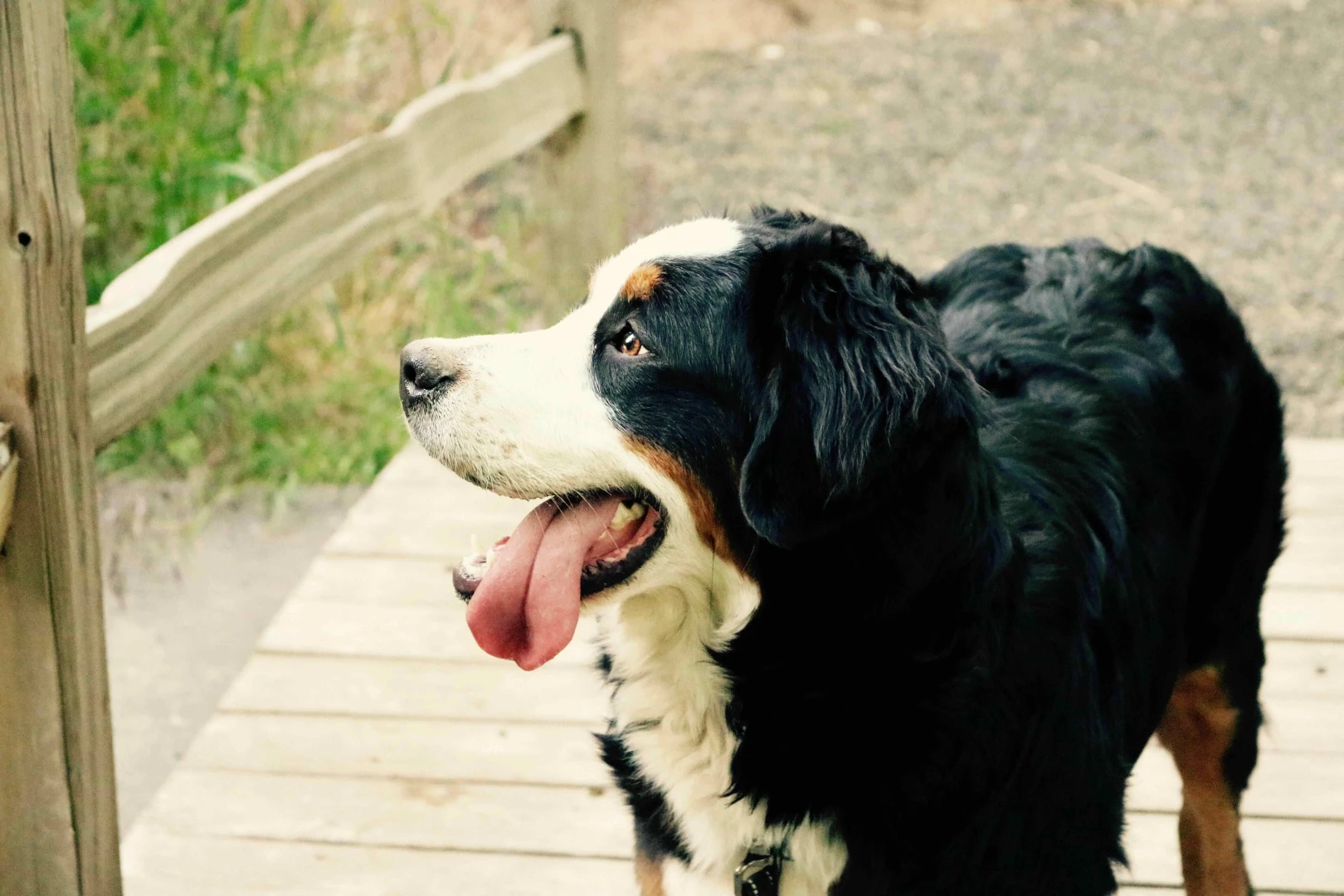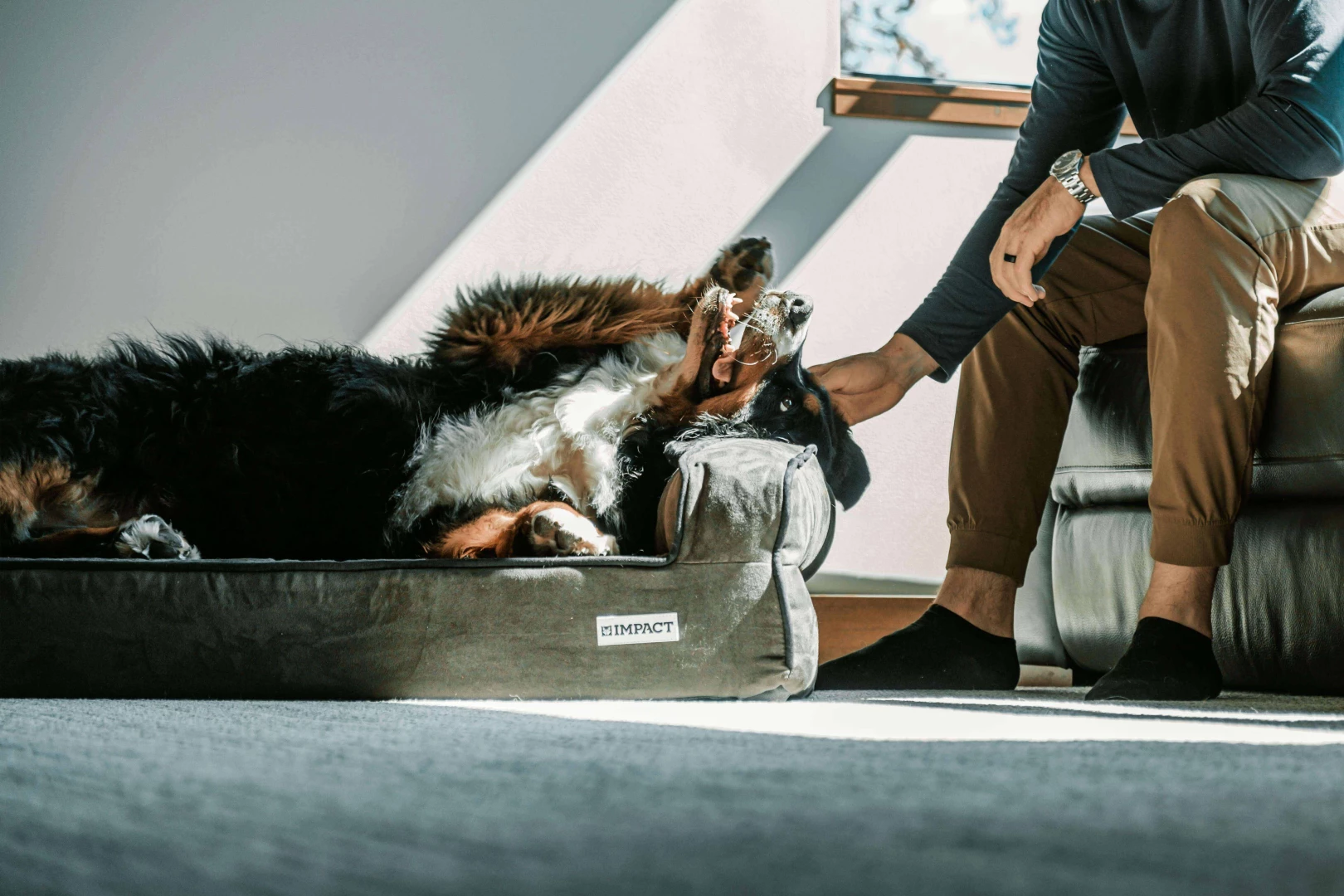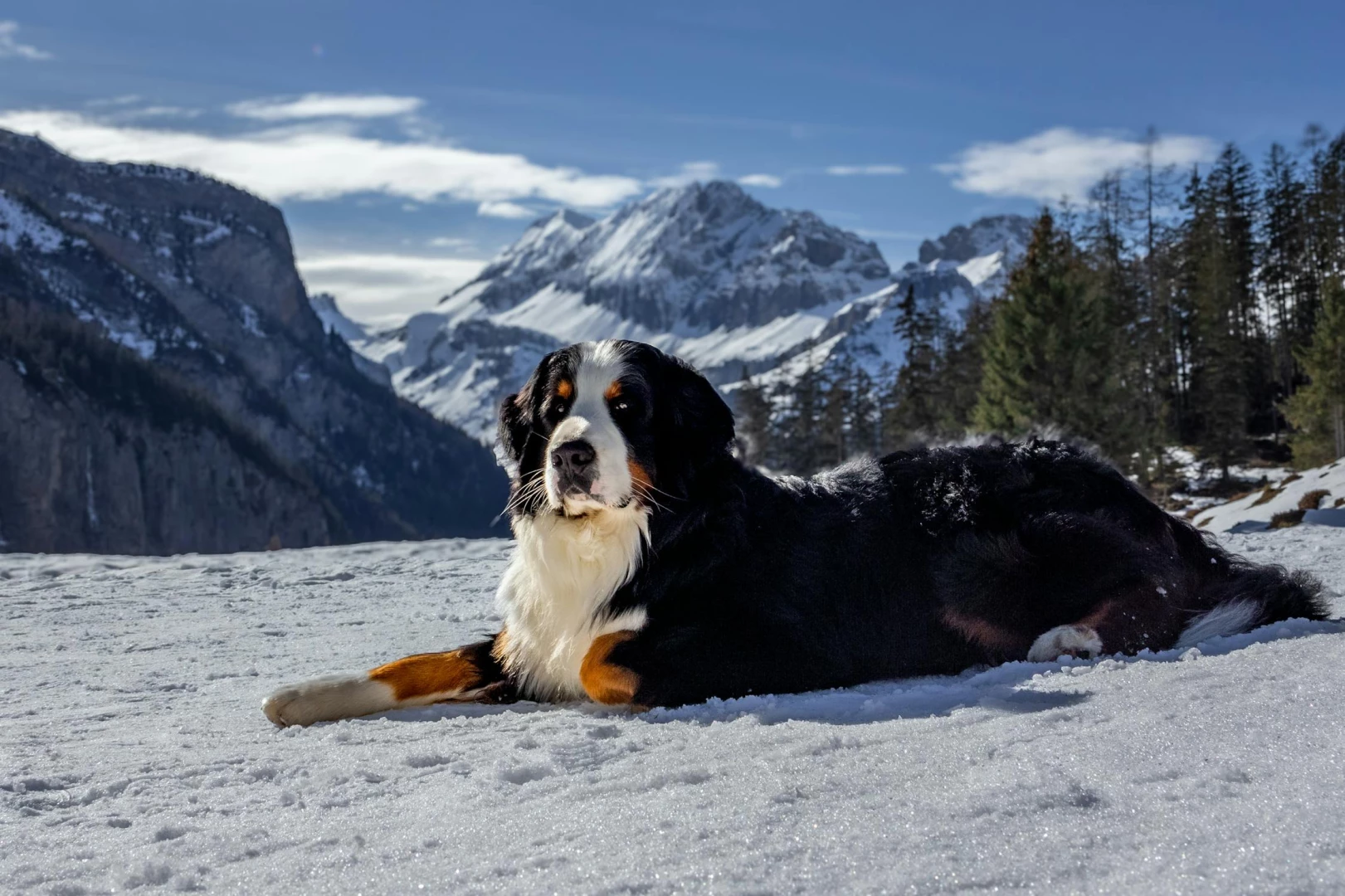On this page
About Bernese Mountain Dogs
Bernese Mountain Dogs are majestic and versatile working dogs with a history rooted in the Swiss Alps. Known for their striking tri-colored coats and gentle demeanor, they are part of the Sennenhund family, which also includes breeds like the Appenzeller and Greater Swiss Mountain Dog. Their unique combination of strength and gentleness has made them invaluable farm companions for centuries.
Dr Andrew Jones says, “Bernese Mountain Dogs stand out for their adaptability and unwavering loyalty, making them both reliable workers and affectionate family members.”
These dogs were originally bred for their strength, which allowed them to pull heavy carts and herd cattle in harsh Alpine climates. Their intelligence and calm temperament have also made them exceptional companions for families worldwide.
Uncover more about Bernese Mountain Dogs and their remarkable traits!
Bernese Mountain Dog Origin: Where Do They Come From?
Bernese Mountain Dogs come from Switzerland, specifically the canton of Bern. Their history dates back over 2,000 years when Roman soldiers brought Mastiff-like dogs to the Alpine region. These dogs were then crossbred with local breeds, resulting in the strong and versatile Bernese Mountain Dog we know today.
Michael Lazaris explains, “The breed’s roots in Switzerland highlight their ability to adapt to cold weather and rugged terrains, making them essential farm helpers.”
Unlike other Swiss breeds, such as the Appenzeller Sennenhund, Bernese Mountain Dogs were bred for a combination of power and patience, which allowed them to excel in various tasks on the farm.
Why Were Bernese Mountain Dogs Originally Bred?
Bernese Mountain Dogs were bred as all-purpose farm dogs. Their roles included herding cattle, pulling carts loaded with goods, and guarding farms. Their muscular build and calm demeanor made them suitable for these physically demanding tasks.
Compared to breeds like the Border Collie, which excels in herding agility, Bernese Mountain Dogs are better suited for heavy-duty tasks due to their strength and endurance.
Physical Traits and Lifespan
Bernese Mountain Dogs are a large and sturdy breed, known for their strength, endurance, and striking appearance. Their thick double coat and robust build make them well-suited for cold climates and physically demanding tasks. Despite their large size, they are surprisingly gentle, which adds to their appeal as family companions.
PetMD, “The Bernese Mountain Dog’s physical traits are as functional as they are beautiful, designed to withstand harsh Alpine conditions while performing a variety of farm duties.”
How Big Do Bernese Mountain Dogs Get?
Bernese Mountain Dogs are one of the larger dog breeds, with males typically weighing between 38-50 kg and females 36-48 kg. Their height at the shoulder ranges from 64-70 cm for males and 58-66 cm for females. This impressive size contributes to their strength but also requires careful training and handling.
Compared to medium-sized breeds like the Golden Retriever, Bernese Mountain Dogs are more robust and built for heavy-duty tasks, though this comes with added care responsibilities.
What Is the Average Lifespan of a Bernese Mountain Dog?
The average lifespan of a Bernese Mountain Dog is 7-10 years, which is relatively short compared to smaller breeds. This is due to their susceptibility to health conditions such as cancer, bloat, and joint issues. However, with proper care and early health screenings, some Bernese Mountain Dogs live beyond the average expectancy.”
In comparison, smaller breeds like Beagles, which can live up to 15 years, have fewer genetic health challenges, but they lack the physical capabilities of Bernese Mountain Dogs.

Temperament and Behavior
Bernese Mountain Dogs are known for their calm, affectionate, and gentle temperament. They are highly social and thrive in environments where they can bond closely with their families. Despite their large size, their demeanor is often described as being that of a “gentle giant.” Their intelligence and eagerness to please make them relatively easy to train, though they require consistent guidance.
Are Bernese Mountain Dogs Good with Families?
Bernese Mountain Dogs are an excellent choice for families. Their patience and calmness make them particularly good with children. They are naturally protective but rarely aggressive, making them reliable companions for households with babies, toddlers, or older family members.
Unlike breeds such as the Dalmatian, which can sometimes be overly energetic for small children, Bernese Mountain Dogs balance playfulness with gentleness, ensuring a safe and enjoyable relationship with kids.
Dr. Zonram Liao explains, “Their instinctive ability to read emotions and adapt their behavior makes them perfect for families looking for a devoted and protective companion.”
How Friendly Are Bernese Mountain Dogs with Other Pets?
Bernese Mountain Dogs are generally friendly and sociable with other pets. They are known for their easygoing attitude, which helps them integrate well into multi-pet households. Early socialization, however, is key to fostering harmonious relationships, especially with smaller animals like cats.
Canine Journal advises, “Introduce Bernese Mountain Dogs to other pets gradually. Their calm and gentle nature usually ensures smooth interactions, but positive reinforcement during early introductions is crucial.”
Compared to breeds like Huskies, which may have a strong prey drive, Bernese Mountain Dogs are more likely to coexist peacefully with other animals, making them ideal for diverse households.
Caring for Bernese Mountain Dogs
Caring for a Bernese Mountain Dog involves consistent grooming, regular exercise, and meeting their dietary and emotional needs. Their large size and double coat require extra attention, but their loyalty and affection make every effort worthwhile. With proper care, they can remain healthy, happy, and active for years.
What Are the Grooming Needs of a Bernese Mountain Dog?
Bernese Mountain Dogs require regular grooming to maintain their thick double coat. Weekly brushing is essential to prevent matting and reduce shedding. During seasonal shedding periods, daily brushing is recommended to manage the large amounts of loose fur.
Key grooming needs include:
- Brushing: Use a slicker brush for the topcoat and an undercoat rake for thorough grooming.
- Bathing: Bathe them every 6-8 weeks or as needed to keep their coat clean.
- Nail Trimming: Trim their nails every 3-4 weeks to avoid overgrowth.
- Ear Cleaning: Check and clean their ears regularly to prevent infections.
Dr. De La Torre, “Grooming not only keeps your Bernese Mountain Dog looking great but also prevents skin issues and keeps them comfortable.”
Unlike short-haired breeds like Boxers, Bernese Mountain Dogs need more frequent grooming to manage their dense coat and heavy shedding.
How Much Exercise Does a Bernese Mountain Dog Need?
Bernese Mountain Dogs require moderate daily exercise to stay healthy. They enjoy activities like long walks, hiking, and playing in open spaces. On average, they need 30-60 minutes of exercise per day. Puppies should avoid strenuous activities to protect their developing joints.
Suggestions for exercise:
- Daily Walks: Two moderate walks per day are ideal.
- Hiking: They love exploring trails and enjoying nature.
- Cart Pulling: A nod to their historical role, this activity engages their strength and keeps them active.
Dr. Lindsay Butzer explains, “While they don’t need excessive exercise like a Border Collie, Bernese Mountain Dogs thrive on outdoor activities that engage their bodies and minds.”
Compared to smaller breeds like Dachshunds, which can get enough activity indoors, Bernese Mountain Dogs require more outdoor time to satisfy their physical needs.

Health and Maintenance
Bernese Mountain Dogs have specific health considerations that owners should address to ensure a long and fulfilling life. Regular vet checkups, preventive care, and attention to their diet and exercise are essential to maintaining their overall well-being.
What Are Common Health Issues in Bernese Mountain Dogs?
Bernese Mountain Dogs are prone to several health conditions, primarily due to their large size and genetic predispositions. Common issues include:
- Hip and Elbow Dysplasia: Joint disorders that can cause pain and mobility issues.
- Bloat: A potentially life-threatening condition where the stomach twists.
- Cancer: Particularly histiocytic sarcoma, which is more prevalent in this breed.
- Heart Disease: Conditions such as dilated cardiomyopathy.
How Can You Keep a Bernese Mountain Dog Healthy?
Preventive care is crucial for keeping your Bernese Mountain Dog healthy. Here’s what you can do:
- Diet: Feed them a high-quality diet with balanced nutrients. Avoid overfeeding, as obesity can worsen joint issues.
- Exercise: Provide daily physical activities to maintain a healthy weight and keep their muscles strong.
- Vet Visits: Schedule annual health checkups and screenings for common conditions.
Supplements: Use glucosamine and chondroitin for joint health, especially as they age.
Give your Bernese Mountain Dog the care they deserve! Learn how to keep them healthy and happy for years to come.
Living with Bernese Mountain Dogs
Living with a Bernese Mountain Dog is a fulfilling experience. Their affectionate nature and calm temperament make them excellent companions. However, their size and care requirements mean they are best suited for homes with enough space and owners who can commit to their needs.
Do Bernese Mountain Dogs Adapt Well to Small Homes?
Bernese Mountain Dogs are not ideal for small apartments or confined spaces. While they are calm indoors, their size and exercise needs require a larger living area or access to outdoor spaces. Without adequate space, they may become bored or frustrated.
Dr. Tannetje Crocker explains, “Although they can adapt temporarily, Bernese Mountain Dogs thrive in environments where they have room to move and explore.”
Are Bernese Mountain Dogs Suitable for First-Time Owners?
Bernese Mountain Dogs can be a great choice for first-time owners who are ready to meet their care needs. Their friendly and eager-to-please nature makes them relatively easy to train. However, their grooming and health needs can be challenging for inexperienced owners.
Dr. Marcus Dela Cruz, “First-time owners should research the breed’s unique requirements to ensure they can provide the care Bernese Mountain Dogs need.”
Conclusion
Bernese Mountain Dogs are loyal, gentle, and hardworking companions that bring joy and love to any household. With proper care, including regular grooming, exercise, and preventive health measures, they can lead fulfilling lives. Their affectionate nature makes them a great choice for families and individuals who can dedicate time to their needs.
FAQs About Bernese Mountain Dogs
- How long do they live?
7-10 years
- Are they good with other pets?
Yes, if properly socialized.
- Do they bark a lot?
Not excessively, but they alert their owners.
- How big do they get?
Males: 80-115 lbs, Females: 70-95 lbs
- Are they easy to train?
Yes, intelligent and eager to please.
- Do they drool?
Occasionally, especially after drinking.
- Best climate for them?
Cooler climates; they struggle in heat.
- How often should they be groomed?
2-3 times a week, daily during shedding season.
- Do they get separation anxiety?
Yes, they need companionship.
- Do they need a big space?
A yard is ideal, but they can adapt with enough exercise.
Start your journey with a Bernese Mountain Dog by downloading the Dosty App! Organize care routines, track health, and learn more about your furry friend today

